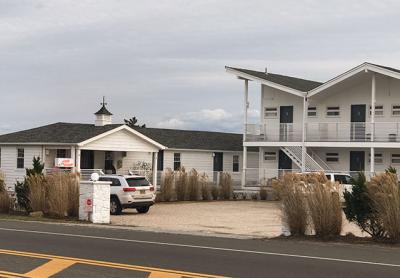Montauk Hotel Wants to Add a Restaurant

The East Hampton Town Planning Board spent a good portion of its Dec. 13 meeting on the Hero Beach Club, the former Oceanside Beach Resort, where a 16-seat restaurant in one of the three buildings on the property, which is just under an acre. A large painting of a face with a winking eye marks the exterior of the main building.
The property is in a resort zone, where accessory restaurants are allowed with planning board approval. Three guest rooms were removed from a building on the northeastern part of the site to make room for the restaurant. The town’s principal building inspector, Ann M. Glennon, has said, however, that the restaurant building “would not be considered freestanding but an accessory to the motel” because it contains the hotel’s office.
On June 29, the State Liquor Authority approved a license for the hotel, which is owned by a limited liability company headed by Jon Krassner, Edward P. Wasserman, and Michael L. Hensch. The company bought the property for $9.6 million and has since invested over $1 million in renovations and an additional $500,000.
At the Dec. 13 session, planning board members voiced both support for and concern about the application. Diana Weir, whose term ends at the end of the year, thanked the owners for investing in the community. “I am very supportive,” Nancy Keeshan said. “You guys have done a first-class job of cleaning that place up.”
Kathleen Cunningham, however, expressed concern about the sanitary system. “You can’t put a restaurant there until there is a community sewer system,” she said. If and when such a system will become a reality is unclear.
Parking was another concern. Tiffany Scarlato, attorney for the owners, told the board there is room for 21 spaces in front of the building and that because the site predates zoning there are 23 spaces “vested,” or grandfathered in, on South Eton and South Emerson Streets.
In an Oct. 25 letter, Ms. Scarlato described the reasons for a new restaurant. “The restaurant is intended to service guests of the resort with a quick bite to eat, whether it is breakfast or lunch,” she wrote. “The resort is situated on the outskirts of the main business district, a distance away from the nearest restaurant, making this element of the resort not only important but necessary for the resort to be sustainable in today’s industry.” She did not mention dinner service.
Randy Parsons, a board member, was not moved. “For me, this is too much.”
“It could, at some point in the future, get out of hand,” Job Potter, the chairman, said. “I remain a non-supporter.”
Beyond the septic and parking issues, several members were concerned about whether the Hero Beach Club would become another nighttime “hot spot” in downtown Montauk. Britton Bistrian of Land Use Solutions, representing the owners, said by phone on Tuesday that a hot spot was antithetical to the owners’ goals. “There were no noise complaints this year,” she said. The last thing a guest at an exclusive high-end resort wants to hear is revelers throughout the night, she said.
The liquor license allows drinks throughout the grounds — at poolside, on decking, and on a large lawn. It also allows 30 to 35 tables, seating up to 115 people, and up to 499 people on the property. Recorded and live music are permitted under the license, which cites “classic rock, beach/surf music, Jimmy Buffett, etc.”
Ms. Bistrian pointed out that elsewhere in the license, where the number of security workers had to be specified, the number entered was zero. This showed, she said, that the owners do not seek to become a popular night spot, requiring numerous security personnel at night.
After the meeting, Mr. Potter sent Ms. Bistrian a letter indicating that the board was satisfied with some aspects of the application. He asked that the landscaping be depicted on the site plan. However, he wrote, the board still needs to determine whether or not the parking requirements have been met.
The owners originally applied to be allowed to use the building that will be a restaurant for takeout food and beverages. The East Hampton Town Board outlawed such use at resorts soon afterward, leading the owners to launch a lawsuit against the town. According to Ms. Scarlato, the matter is still being litigated.
